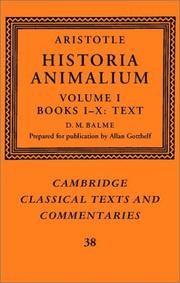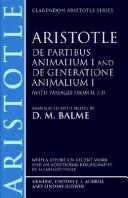| Listing 1 - 10 of 28 | << page >> |
Sort by
|
Book
ISBN: 9004315969 9004315950 9789004315952 9789004315969 Year: 2019 Publisher: Leiden Boston
Abstract | Keywords | Export | Availability | Bookmark
 Loading...
Loading...Choose an application
- Reference Manager
- EndNote
- RefWorks (Direct export to RefWorks)
Aristotle’s Historia Animalium is one of the most famous and influential zoological works that was ever written. It was translated into Arabic in the 9th century CE together with Aristotle’s other zoological works, On the Generation of Animals and On the Parts of Animals . As a result, the influence of Aristotelian zoology is widely traceable in classical Arabic literary culture and thought. The Arabic translation found its way into Europe through the 13th-century Latin translation by Michael Scotus, which was extensively used by medieval European scholars. A critical edition of the Arabic Historia Animalium has long been awaited, and Lourus Filius’s edition, based on all extant Arabic MSS, as well as on Scotus’s Latin translation, can rightly be seen as a scholarly landmark.
Zoology --- Pre-Linnaean works of zoology --- Pre-Linnean works of zoology --- Aristotle. --- Aristotle. - Historia animalium
Book
ISBN: 1107015154 9781107015159 Year: 2023 Publisher: Cambridge Cambridge University press
Abstract | Keywords | Export | Availability | Bookmark
 Loading...
Loading...Choose an application
- Reference Manager
- EndNote
- RefWorks (Direct export to RefWorks)
Zoology --- Pre-Linnaean works of zoology --- Pre-Linnean works of zoology
Book
ISBN: 9781139057721 9781107015159 Year: 2023 Publisher: Cambridge, United Kingdom ;New York, NY Cambridge University Press
Abstract | Keywords | Export | Availability | Bookmark
 Loading...
Loading...Choose an application
- Reference Manager
- EndNote
- RefWorks (Direct export to RefWorks)
This is the first modern edition of Book X of the Historia Animalium. It argues that the first five chapters are a summary, from the hand of Aristotle, of a medical treatise by a physician practicing in the fourth-century BCE. This gives short shrift to Hippocratic staples such as trapped menses and the wandering womb, and describes a woman's climax during sex in terms that can be easily mapped onto modern accounts. In summarizing the treatise and examining its claims in the last two chapters, Aristotle follows the method described in the Topics for a philosopher embarking on a new field of study. Here we see Aristotle's ruminations over the conundrum of a woman's contribution to conception at an early stage in the development of his theory of reproduction. Far from being an insignificant pseudepigraphon, this is a central text for understanding the development of ancient gynaecology and Aristotelian methodology.
Zoology --- Pre-Linnaean works of zoology --- Pre-Linnean works of zoology

ISBN: 0521480027 9780521480024 Year: 2002 Volume: 38 Publisher: Cambridge Cambridge University press
Abstract | Keywords | Export | Availability | Bookmark
 Loading...
Loading...Choose an application
- Reference Manager
- EndNote
- RefWorks (Direct export to RefWorks)
Zoology --- Pre-Linnaean works of zoology --- Pre-Linnean works of zoology --- Pre-Linnean works --- Zoology - Pre-Linnean works
Book
ISSN: 03944400 ISBN: 8822253973 9788822253972 Year: 2004 Volume: 45 Publisher: Firenze Olschki
Abstract | Keywords | Export | Availability | Bookmark
 Loading...
Loading...Choose an application
- Reference Manager
- EndNote
- RefWorks (Direct export to RefWorks)

ISBN: 0198751281 Year: 1992 Publisher: Oxford Clarendon
Abstract | Keywords | Export | Availability | Bookmark
 Loading...
Loading...Choose an application
- Reference Manager
- EndNote
- RefWorks (Direct export to RefWorks)
Reproduction --- Zoology --- Pre-Linnaean works of zoology --- Pre-Linnean works of zoology --- Amphimixis --- Generation --- Pangenesis --- Procreation --- Biology --- Life (Biology) --- Physiology --- Sex (Biology) --- Embryology --- Generative organs --- Theriogenology --- Botany
Book
ISBN: 3110708736 3110708868 9783110708738 Year: 2022 Publisher: Berlin/Boston : Walter de Gruyter GmbH,
Abstract | Keywords | Export | Availability | Bookmark
 Loading...
Loading...Choose an application
- Reference Manager
- EndNote
- RefWorks (Direct export to RefWorks)
Der älteste griechischsprachige Kommentar zur Schrift De partibus animalium des Aristoteles wurde 1904 unter dem Namen des Michael von Ephesos (12. Jh.) in der Reihe Commentaria in Aristotelem Graeca ediert (CAG 22.2). Im vorliegenden Band werden zwei voneinander unabhängige Redaktionen dieses Kommentars herausgegeben: Eine jüngere Redaktion (B) ist Georgios Pachymeres (1242 – ca. 1310) zuzuschreiben; die ältere Redaktion (A) ist anonym überliefert. Beide Bearbeitungen streben nach einer Aktualisierung des Kommentars und ergänzen Erläuterungen zum zweiten Buch von De partibus animalium – mit solchem Erfolg, dass für diese Teile die Redaktion des Pachymeres als Text Michaels ediert wurde. In der Einleitung werden die Quellen und die Textgeschichte der beiden Redaktionen analysiert und das Umfeld der byzantinischen Gelehrten beleuchtet, die den Gehalt und die Methoden der aristotelischen Wissenschaft vom Lebendigen propagierten und weiterentwickelten. Michael of Ephesus’ commentary on the Aristotelian tract De partibus animalium exists in two editions, the older by an anonymous scholar, and the second Edition B by Georgios Pachymeres. Both update the commentary as a whole and supplement the missing commentary on Book II. Edition B was edited under the name of Michael. This volume includes both editions, newly revised with an analysis of their textual history.
Book
ISBN: 9783484523425 3484523425 3110946092 Year: 2007 Volume: 342 Publisher: Tübingen : Max Niemeyer Verlag,
Abstract | Keywords | Export | Availability | Bookmark
 Loading...
Loading...Choose an application
- Reference Manager
- EndNote
- RefWorks (Direct export to RefWorks)
Verena Dehmer untersucht eine altspanische Handschrift der Biblioteca Nacional de Madrid von Aristoteles zoologischem Hauptwerk »De animalibus« unter Anwendung philologischer, traduktologischer und sprachhistorischer Methoden. In der Einleitung stellt sie die Biologie des Aristoteles mit ihrer Überlieferungs- und Wirkungsgeschichte sowie den historischen Rahmenbedingungen für naturwissenschaftliche Studien auf der Iberischen Halbinsel im 13./14. Jahrhundert dar. Im Hauptteil werden Auszüge aus der Handschrift erstmals ediert, mit dem arabischen und dem (zur Zeit nur teilweise edierten) lateinischen Text von Michael Scotus verglichen und kommentiert. Die Kommentare beziehen sich aus linguistischer und sprachhistorischer Sicht auf einzelne Wörter und Begriffe, syntaktische Erscheinungen oder auch biologisch interessante Passagen oder Fachtermini. Die Autorin erbringt den Nachweis, dass zwei Übersetzer gleichzeitig aus dem Arabischen und dem Lateinischen ins Kastilische übersetzten - eine bislang noch unbelegte Arbeitstechnik. Die vorgenommenen Textkürzungen wurden im Hinblick auf die wissenschaftsgeschichtliche Einordnung hin untersucht. Als Entstehungszeitraum kommt die Wirkungszeit Alfonsos el Sabios (1221-1284) in Frage, wenngleich andere Auftraggeber als der König selbst diskutiert werden.
Zoology --- Zoologie --- Pre-Linnean works. --- Ouvrages prélinnéens --- Aristotle. --- Biblioteca Nacional (Spain). --- Aristotle --- Biblioteca Nacional (Spain) --- Ouvrages prélinnéens --- Pre-Linnaean works of zoology --- Pre-Linnean works of zoology --- Zoology - Pre-Linnean works --- Aristotle - Historia animalium
Book
ISBN: 9783110220056 9783110973570 3110220059 311097357X 3111834395 Year: 2009 Publisher: Berolini Novi Eboraci De Gruyter
Abstract | Keywords | Export | Availability | Bookmark
 Loading...
Loading...Choose an application
- Reference Manager
- EndNote
- RefWorks (Direct export to RefWorks)
More than 140 years have gone by since R. Hercher's 1864 Teubner edition, a book with serious editorial shortcomings which have been often underlined in recent publications. This new text offers an accurate and new critical edition as a result of an extensive and detailed work undertook by a team of scholars of the University of Oviedo (Spain), under the direction of the Professor Manuela García Valdés. The text has been established on the basis of a complete collation of all the most significant manuscripts of Aelians' textual tradition. This is the first edition with an accurate and scientific critical apparatus by applying the scope of textual criticism and ecdotics. The edition also takes into account the literary koiné of II-III centuries AD and the authors' own style. This edition offers to all scholars a reliable text as a starting point for future research on Aelians' Language and Stoic thought. It will be also useful for studies on zoology, on animals' habits and behaviour, medieval bestiaries, and on the concepts of Science and Technique in Late Antiquity. Confronted with his wealth of materials, the author writes each chapter as a finished unit, as a short story. He uses a wide variety of both literary and linguistic expedients, resorting to formal and content resources.
Zoology --- Animals --- Zoologie --- Animaux --- Pre-Linnean works. --- Early works to 1800 --- Ouvrages prélinnéens --- Ouvrages avant 1800 --- Pre-Linnaean works of zoology --- Pre-Linnean works of zoology --- Zoology - Pre-Linnean works
Book
ISBN: 9789004118638 9789004502635 Year: 2000 Publisher: Leiden Boston Köln : Brill,
Abstract | Keywords | Export | Availability | Bookmark
 Loading...
Loading...Choose an application
- Reference Manager
- EndNote
- RefWorks (Direct export to RefWorks)
This volume contains the critical edition of the first Greek-Latin translation of De historia animalium (books 1-5), Aristotle's longest treatise on biology. The translation was made by William of Moerbeke shortly after 1260. Using the manuscript evidence as a starting-point, the editors examine the spread of this new source of ancient knowledge in the late 13th and early 14th century. The preface also contains a brief survey of the translation's first users, and further deals with the Greek sources of the translation, and the criteria for the reconstruction of the original wording of the text. The edition is particularly important for classical philologists who want to compare the Latin version with the Greek text, for Latin lexicologists because of its vast variety of new terminology, and for all those interested in the spread of ancient scientific thought at the medieval universities and among scholars. It will be completed with the publication of the second part of the treatise (books 6-10), combined with a complete Latin-Greek and Greek-Latin lexicon.
Zoology --- Animals --- Pre-Linnean works --- Pre-Linnaean works of zoology --- Pre-Linnean works of zoology --- Animal kingdom --- Beasts --- Fauna --- Native animals --- Native fauna --- Wild animals --- Wildlife --- Organisms --- Human-animal relationships
| Listing 1 - 10 of 28 | << page >> |
Sort by
|

 Search
Search Feedback
Feedback About UniCat
About UniCat  Help
Help News
News